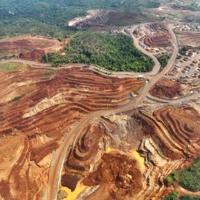Nickel mining threatens one of the world’s most important marine biodiversity and coral hotspots in Indonesia, despite the government revoking several permits, a report warned Thursday.
Analysis of recent and historic mining in the region showed a “domino effect of destruction,” ranging from deforestation on land to sediment run-off smothering coral reefs, the report by NGOs Auriga Nusantara and Earth Insight said.
“Post-mining rehabilitation is very poor,” Auriga Nusantara executive director Timer Manurung told AFP. “We worry that the current nickel mining will impact Raja Ampat for decades to come.”
Raja Ampat is part of the famed Coral Triangle, beloved by divers for its marine riches.
In June, Indonesia’s government revoked permits for four of the five nickel mining companies operating in the cluster of islands and shoals in Southwest Papua Province.
That followed an outcry from activists and residents over the impact of mining for the metal used in everything from stainless steel to electric vehicles.
In September, the government allowed one company — PT Gag Nikel — to restart operations, arguing the impact “can be properly mitigated.”
But NGOs say serious damage has already been done, and there is little sign of clean-up.
Images captured by the groups in the region show sediment run-off turning otherwise emerald waters murky brown, downhill from stripped hilltops.
They also documented bleached and damaged coral at current and former mining sites, near jetties and areas affected by sediment run-off.
While warmer waters caused by climate change have caused coral bleaching in many parts of the world, Timer said coral just 50-100 metres (160-320 feet) away from the surveyed areas remained healthy.
The groups also fear mining could restart in the region, noting no formal revocation letter has been published by the government so far.
“Even though there is no active mining operation on sites, the staff of the companies and its heavy machinery are still there,” said Timer.
Indonesia’s mineral resources ministry did not immediately respond to a request for comment.
Until earlier this year, nickel mining concessions covered 22,000 hectares (54,300 acres) of the Raja Ampat region’s 3.66 million hectares, much of it inside a designated UNESCO Global Geopark.
These areas are recognised by the UN body for their “international geological significance” and are meant to be “managed with a holistic concept of protection, education and sustainable development,” UNESCO says.
Gag Nikel’s operations lie outside the Geopark.
Indonesia has the world’s largest nickel reserves and has sought to spur domestic processing to capture more of the value chain.
sah/jm


